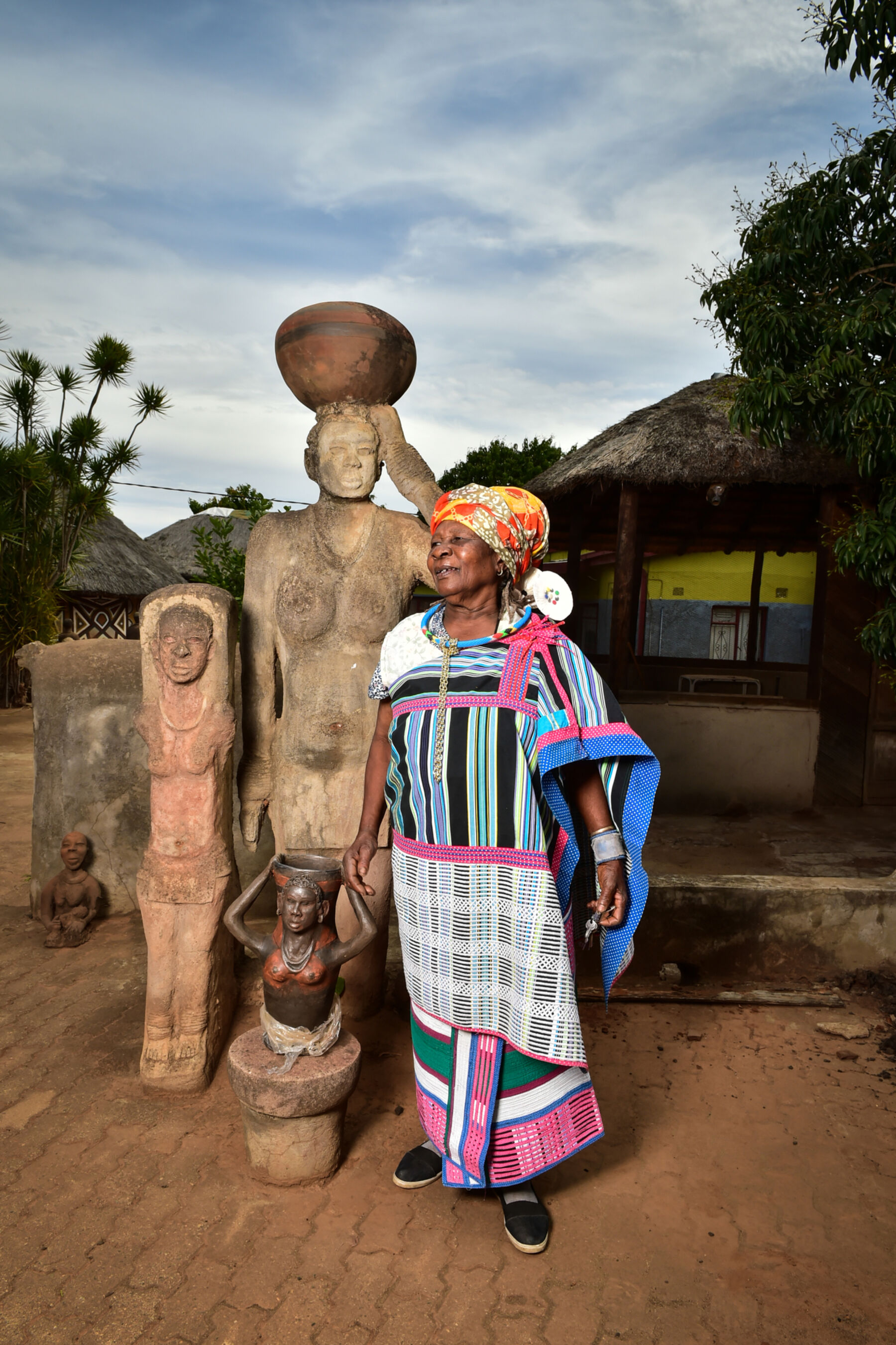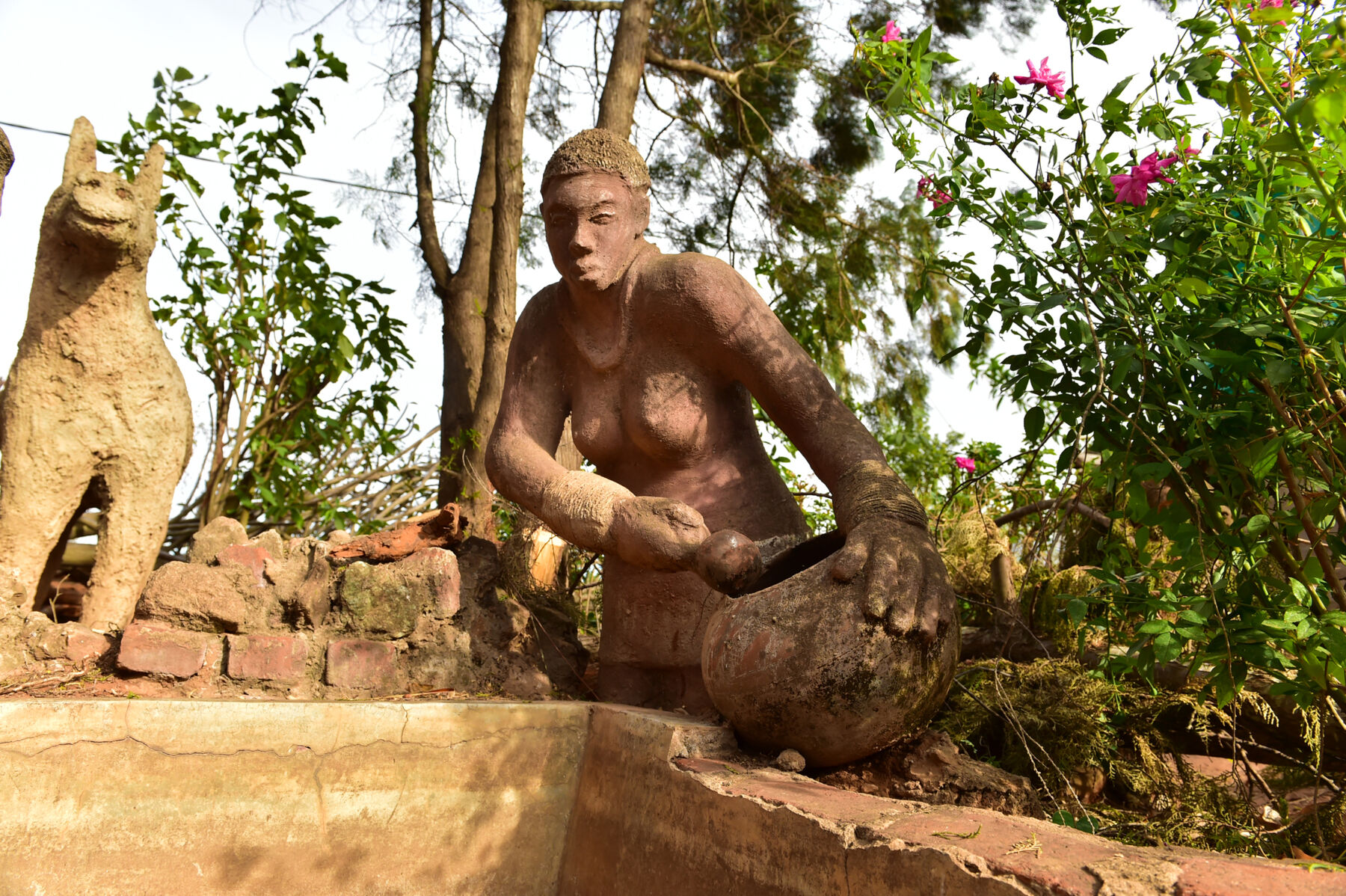*Taking an L: the moment you learn a valuable lesson; being put in your place when you are wrong.
The date was 22 October 2018, and at 4am in Rosebank, a team from Flow Communications readied itself to depart on a special assignment to Limpopo: interviewing the iconic wood and clay artist, Noria Mabasa, in Tshino Vuwani, Venda. This was on behalf our, client the Department of Arts and Culture, for a Living Human Treasures book project.
For one of them (me), it would be his first time in an area formerly known as the northern Transvaal, and he wasn’t quite sure what to expect. I didn’t have have high expectations – the bar was set so low a five-year-old wouldn’t have to jump to reach it. So, what was there to look forward to, then? Only the honour of interviewing Makhulu Noria, the first black woman in South Africa to become a world-renowned wood carver. I couldn’t wait to meet this living treasure and learn more about her life, art, and the immense contribution she’s made to the promotion of the indigenous arts.
We rolled out in a minivan en route from Gauteng to Limpopo with photographer Steve Lawrence at the wheel. Give that man a cooler box full of energy drinks and his smooth driving will take you to infinity and beyond, while staying sharp enough to beat a curve that spits out an oncoming car out of the blue (I’m fine, ma. Don’t worry).

I now understand why every time Steve comes to the Flow office the place is like a TV show on which a surprise guest everybody loves is brought out. Cups and tins of caffeine kept him fresh, funny and focused throughout the trip as he shovelled between topics in interesting conversation with Flow writer Christina Kennedy.
Now, if the abductions on the film Mars Needs Moms were real, Christina would be the first one to get beamed up – the aliens would likely agree that such a considerate, empathetic and dependable person should be cloned and made available in all corners of the galaxy. Christina was a generous team leader who took good care of her crew (if you behaved, she’d let you have burgers for breakfast – just ask Tondani Luvhengo).
Speaking of my Flowstar of the year, Tondani (a business development executive at Flow) played an instrumental role in facilitating conversation between generations during the interviews with 80-year-old Noria. Like a strong bridge, our top-tier multilingual translator allowed English and Tshivenda traffic to cross between and connect two vastly different worlds: Gauteng and Limpopo, new school and old school, the silent and the millennials. This made it it possible to share lively chats and laughter with Makhulu.
The moment we sat down with her, Makhulu gave us Tshivenda names that she used to address us until the last day of our trip. Steve is now known as Nyengedzeni (the added one) in Venda, Christina’s name is Mbavhalelo (one who takes good care) and I, Tumelo, am known as Idani Navho (which literally translates to “come with them”, but as a name it is synonymous with messenger).

As a young literary-works creative myself, I was looking forward to dipping my cup in her well of wisdom. And boy did she pour until my receptacle runneth over!
She’s an amazing storyteller who, in her boundless wisdom, answered one of the multiple questions we’d prepared with a reply that I will remember forever. “I have been alive for many decades,” she told the eyes staring at her with great admiration, “working with the tools and gift I have been blessed with. Now that I am older and less strong than I was, I probably should rest. But that’s not who I am – I will keep sharing my knowledge and talents for as long as there’s still life in my body.”
The statement resonated with me and spoke to my ambitions as a writer working towards making that perfect connection with words. She helped normalise my fascination with exploring different themes and challenging myself to distinguishably stitch words together on paper in both short and elaborate bodies of work; to keep searching for ways to elevate and improve my skill set, never resting on yesterday’s glory.

About taking that L in Limpopo. It all started when I felt like agent Everett K Ross the first time he saw the real Wakanda in the film Black Panther – like him, the places I saw in the province went against all my preconceived notions. The temperature in Venda was pleasantly cool that I immediately wished the fresh air could be bottled and taken back to GP. From the town of Elim to Tshino Vuwani, serenity stretched over kilometres of green and lush flora that invites your entire being to simply relax.
The villages we passed through are a perfect example of progressive development in one’s natural habitat – people have built “modest mansions” on their property. My guess is the smallest house must have at least three bedrooms with an enormous vegetable patch instead of a pool. The sites we witnessed as we were driving through the province were a piece of Black Consciousness that would make Steve Biko proud to see how fellow Africans have built on the teachings of yore while embracing the changing times.

The two nights spent in Limpopo can best be described using the urban oxymoron, “Hella nice!” Monday night, we slept at a hellish lodge that made a flat in Hillbrow look like a luxury suite, with pillows that made me want to send a Facebook friend request to the nearest chiropractor the next day. But it got a lot better when we arrived at the Venda village lodge named H12 Leshiba.
We drove up a harsh road between mountains that would make a mechanic cut your licence in half for being a reckless car owner. The densely forested area was a remarkable sight to behold as a safari vehicle gave us a lift from a pick-up point to the mountain summit where stunning rondavels at H12 Leshiba had been prepared for our stay. The team finally got a chance to unwind sitting around a campfire as we had supper and good conversations.
We enjoyed a lovely breakfast the following morning and visited parts of the lodge where several of Makhulu Mabasa’s creations are housed, and got to see the rondavels named after her and former state president Thabo Mbeki.
At one point we spotted game in the distance that made me feel like a five-year-old at the zoo with his parents – someone would go, “Look, Tumi. A rhino!” And every time, I’d fall for it: “Cool! Where?”

I also got to better appreciate the complex rock formations as we drove back to the pick-up point at the base of the mountain (a trip on which I found myself opening so many gates between Makhulu’s heavy hek and Leshiba’s hinged barriers that you might as well call me Will Gates).
Limpopo has a rich culture and heritage, quality fresh produce sold at prices that rival what you find at discount stores, and, most importantly, people who are warm and welcoming (like the kind Roots Grill employee who agreed to braai our meat even though we arrived just after her shift had ended).
So I was wrong about Limpopo (not too proud to admit it). And now I’m taking that L with pride.


